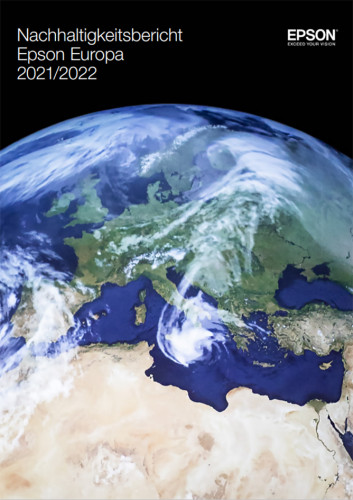Epson's fifth sustainability report for the European region provides information on the technology group's measures, progress and strategic goals with regard to environmental, social and corporate activities. This year's report is verified by the independent Bureau Veritas - a first in the industry.
The European Sustainability Report 2021/22 was put through its paces as part of the SDG certification process conducted by Bureau Veritas. Epson is the first company in its industry worldwide to successfully complete this process. The current report is prepared in accordance with non-financial reporting standards and covers all business areas, with a focus on energy, supply chain and circular economy.
"No chance for greenwashing," says Henning Ohlsson, Director of Sustainability at Epson Europe and Managing Director of Epson Deutschland GmbH. "There are too many declarations of intent and too few externally verifiable measures by companies in terms of sustainability. We want to actively counter this," Ohlsson continues. "Epson's guiding principle is to give more than we take. We have a clear vision and a very comprehensive action plan. We are now in our fifth year of voluntarily producing our sustainability report, which shows in a structured way where we stand. The audit of the report by an independent institute is only a logical consequence for us; for customers it should provide helpful orientation."
Renewable energies
Epson's goal is to use only electricity from renewable sources worldwide by 2023. The latest data shows that the Group has taken the necessary steps to achieve this. All offices in Europe and all plants and sites in Japan are already powered by renewable energy. The company relies on a mix of solar, wind, geothermal and hydro power.
Sustainable transport
Epson is focusing on building a supply chain optimised for sustainability. In Europe, the focus of the measures is particularly on the transport of goods. By converting the vehicle fleet to electric, hybrid and low-emission vehicles, emissions per vehicle have been reduced to below 105 g CO2 per 100 km. Optimising the use of the loading area resulted in almost ten percent more goods being transported per pallet. The switch from air to sea freight for the transport of goods and the opening of a new warehouse saved over 6.8 million kg of CO2.
Sustainable technologies for customers
Epson develops technologies that help customers achieve their sustainability goals. One example of this is the EcoTank printers. These devices use ink tanks to reduce cartridge waste. In total, more than 70 million printers have been sold to date. Energy-efficient Micro-Piezo inkjet printers with Epson's proprietary Heat-Free technology can be up to 83 per cent more energy efficient than laser printers.
The PaperLab, a paper recycling machine, is in use in several countries. The machine is based on dry-fibre technology, which reduces raw materials (e.g. paper) into fibres. At PaperLab, new paper is produced from old office paper, with a considerably lower consumption of water.
The Japanese company is also researching new environmental technologies, including bioplastics. As part of a consortium, the company is working on a biomass plastic made from seaweed. The goal is to produce 200,000 tonnes of it annually by 2030. Epson is also exploring the use of powdered metals (derived from scrap metals) for 3D printing to create a circular infrastructure in areas such as automotive and electrical component manufacturing.
"As the effects of climate change become more apparent and severe, appropriate sustainability measures are more important now than ever. Epson is fully investing both financially and strategically in a more sustainable future. We are creating change, delivering customer solutions and raising the awareness necessary to create an increasingly sustainable world," says Yoshiro Nagafusa President of Epson Europe.
Strengthening education through technology
Education is crucial to Epson as a key enabler for a sustainable future. The company is working to raise this awareness internally as well as with partners, suppliers, customers and society at large.
This broader social engagement also includes exchanges with children and young adults. In Europe, Epson has launched the New Horizons education initiative. It aims to reach 10,000 participants a year, providing them with information and technology to help them better understand the meanings and contexts and better assess the impact of their actions.
Epson also engages with events such as the UN Climate Conferences to raise awareness of climate and environmental issues. Epson launched its international "Climate Barometer" study at COP26 in 2021 and continued it at COP27 in Egypt in 2022. The Barometer examines the attitudes and activities around climate change of more than 20,000 respondents worldwide to improve decision-making by governments, businesses and individuals.
Global benchmarks
The latest sustainability report also shows which international benchmarks Epson had in 2021/22. These include inclusion in the CDP A-list for the second consecutive year, Platinum rating from the Responsible Business Alliance (RBA) for the third consecutive year, and inclusion in the FTSE4Good Index for the 19th consecutive year.
Epson is committed to the UN Sustainable Development Goals (SDGs). The company is investing €770 million to transition to renewable energy sources, reduce its global emissions to meet the 1.5 degree target, and realise the elimination of fossil resources from 2050.
www.epson.eu
